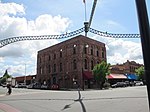Arboga, California

Arboga is an unincorporated community in Yuba County, California. It is located 3 miles (4.8 km), south of Olivehurst on the Sacramento Northern Railroad, at an elevation of 56 feet (17 m). It was named in 1911 by the pastor of the Mission Covenant Church of Sweden for his hometown of Arboga, Sweden.During World War II, a temporary detention camp for Japanese Americans evicted from the West Coast by Executive Order 9066 was located here. The Marysville Assembly Center opened on May 8, 1942, and held 2,465 people before closing on June 29, when the residents were transferred to the more permanent and isolated concentration camp at Tule Lake, California.A post office operated at Arboga from 1912 to 1926.
Excerpt from the Wikipedia article Arboga, California (License: CC BY-SA 3.0, Authors, Images).Arboga, California
Broadway Road,
Geographical coordinates (GPS) Address Nearby Places Show on map
Geographical coordinates (GPS)
| Latitude | Longitude |
|---|---|
| N 39.051388888889 ° | E -121.55583333333 ° |
Address
Broadway Road 1695
95961
California, United States
Open on Google Maps





